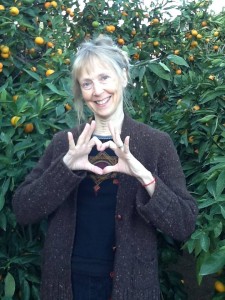 It is almost Valentine’s Day and every year at this time, millions of beehives will soon be trucked from holding yards and commercial apiaries to pollinate almonds trees, which are completely honeybee-dependent. California’s almonds are central to the largest managed pollination event in the world, unique to the US because of how much of the almond market we have. With over 800,000 acres of these trees, this state produces about 80% of the world’s almonds. This crop is one of California’s most lucrative agricultural exports. Approximately 60% of all the managed hives in the United States are needed to pollinate these trees. The bloom lasts for about two weeks, beginning around Valentine’s Day (which I find ironic, given that the stresses and strains on the bees is a complete and utter un-valentine for them).
It is almost Valentine’s Day and every year at this time, millions of beehives will soon be trucked from holding yards and commercial apiaries to pollinate almonds trees, which are completely honeybee-dependent. California’s almonds are central to the largest managed pollination event in the world, unique to the US because of how much of the almond market we have. With over 800,000 acres of these trees, this state produces about 80% of the world’s almonds. This crop is one of California’s most lucrative agricultural exports. Approximately 60% of all the managed hives in the United States are needed to pollinate these trees. The bloom lasts for about two weeks, beginning around Valentine’s Day (which I find ironic, given that the stresses and strains on the bees is a complete and utter un-valentine for them).
Many years ago, I attended a honeybee lecture given by my dear friend Diane Almond (yes, that’s her real name). It was there that I saw my first photo of a flatbed truck with more than 500 hives stacked on it, enroute to California. I sat in the back of the auditorium and sobbed. I just could not believe what I was seeing. It has taken me years to compose an article about this annual American ritual, because I have been sorely un-composed. I needed time to simmer down, restore balance in my soul, find the high road, keep my heart engaged, and to be quiet enough in my bee yard, the sanctuary I share with the bees, to really listen … and know how to respond. And ah, if The Good Bee Road didn’t reveal herself. I flowered into a honeybee educator, speaker, mentor, advocate, artist, steward … and finally finished writing this piece (at long last). So here it is, THE HIGH COST OF ALMONDS … FOR BEES: The Great Elephant in the Room of Modern Apiculture. It is time to get this issue fully out of the bee closet and into the light of day.
I am grateful to Wendy Stancil, Bhramari Devi Dasi, Jack Fischer, and others who have been tending the fire of this same conversation. And infinite thanks to Rowan Jacobsen for writing his seminal book, Fruitless Fall. The chapter called “The Almond Orgy” eloquently describes this largest of all annual pollination events in the world … and its effect on bees.
I offer this article up into the world conversation and consciousness. And I raise a glass to you, the precious honeybees, who I love with all my heart. This is for you, m’dears.
Blessed be, blessed bees.
Debra
PS I will launch The Sacred Path of Bee online series by the end of July. Thanks to everyone for your patience (and especially to Maria, Rebecca and Wann, Zeeva, Wendy and so many others who keep gently knocking on the door). Stay tuned.

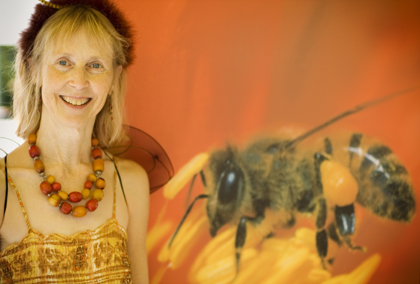
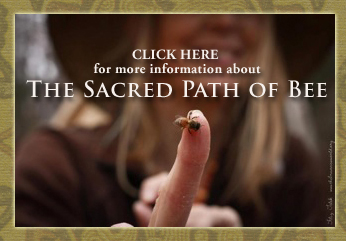

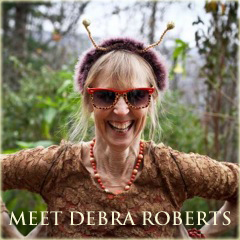
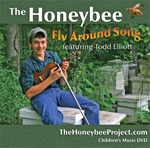

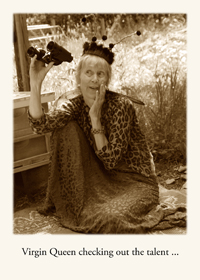

{ 10 comments… read them below or add one }
This is a wonderful article and the essay is equally eloquent and awakening. Thank you so much for all the work that you do to educate, advocate; and offer love and honor to the blessed bees.
Bee Blessed: Bhramari
Dearest Bhramari, thank you so much for this lovely message. Your recent postings / offerings on FB about bees and the sacred and this bee / almond territory are part of what helped me finally get around to posting this article. So lovely to be(e) blessing the bees, and feeling their blessings, in these times with you. <3 Debra
Even after having read your Introduction only I am moved. Love you lots xox
Ah dear Tinah, it is so good to be(e) loving bees in this life with you. Thank you for this message. Love you, Debra
I am so deeply moved. I am an old woman, but a young Bee-carer. My love affair with bees began a few decades ago when I was studying eco-feminist thealogy and exploring the Divine Feminine as revered in the Ancient Middle East. To dis-cover the coincidence that in the “Land of Milk and Honey” the prophetess Deborah’s name meant Bee and that in the neighboring land of Ephesus, the Goddess Diana’s priestesses were called the “Melissae” which also meant Bee led me to the realization of the Sacredness of the Hive and Honey, of the Queen Bee and her Daughters. it was not long after that this Path brought me to my first drum teacher, Layne Redmond ( I was a member of the Mob of Angels) and a deepening of my reverence for Apis Mellifera. But, it wasn’t until two years ago that my spiritual practise became environmental praxis by going to Bee Camp and tending my first Hive. But the magic really started last year when myself two other women founded the Hippy Hive HoneyBee Co-Op. And this Wednesday, Feb. 4th we’re are having the first meeting of our Second Year of the Bee having grown from 13 to 23 members and from 3 to 6 hives (plus a top bar ). I cannot wait to share your Bee-love and Bee-Wisdom with my Hippy Hivester Sisters. Blessed be, Blessed Bee.
SusanMerrie, how lovely to hear from you. And wow, you were one of the Mob? A mutual friend of Layne’s and mine also lives here in the Asheville area – Maria Epes and she was also in the Mob, back in the day. Do you know her? Been in touch? Thanks for everything you shared. And I LOVE the group / co-op you co-founded and its marvelous name. So exciting how the group is growing and I’m not surprised. There is an explosion of interest in bees and their welfare that is particularly happening with women, all over the world. It is so time, so divinely timed. Thanks for your kind words and I look forward to our paths crossing one fine bee-ish day. Please give my love and regards to your Hippy Hivester Sisters. Love and blessings, Debra
Like you Debra, Almond Butter is a staple of my breakfast. I am returning my unopened jars and will look for almond products that do not come from CA.
Hi Shiner, Jack’s Nut Butters out of Asheville (referenced in the article) is one ethical source of almond butter in the US. I am really interested in discovering any other almond growers out there that have a bee / almond / land and life honoring relationship. If you hear of anyone, please post on my FB page or email me and I’ll share. Thanks bee-loved <3
It’s my understanding that buying organic almond butter would be the work-around. We use a good amount of almonds for almond milk (it’s an anti-inflammatory nectar for me in a special turmeric milk-tea that I make) and we also use almonds in the form of almond butter). We already make our own almond milk and as the last of jar of non-organic almond butter goes away (not from *my* shopping trip….grrr), I’ve laid out an “edict” that there will be no more non-organic almond products in our house. I did a Google search and several of the articles strongly suggest that buying organic almond products would take us out of financing unethical growing practices that lead to bee population injury. Here’s a link to the results – https://www.google.com/webhp?sourceid=chrome-instant&rlz=1C1CHWA_enUS615US615&ion=1&espv=2&ie=UTF-8#q=organic%20almond%20bee
There are other products we might avoid in order to avoid contributing/support the unethical growing machine that requires forced bee migrations. This article is great to that end. It mentions several other crops that we can target to only buy organic – http://www.scientificamerican.com/article/migratory-beekeeping-mind-boggling-math/
Bee-love!
Thank you so much for this. I appreciate both links and will share them. I agree that supporting the organic almond products and orchard growers is important – they are probably going to be the diversified farms and will need (for a while) to charge more for their almonds. I never mind paying more in these kinds of circumstances because it reflects an extra effort on the grower’s part to step out of an un-working system. I read in someone’s blog – a non-organic almond farmer and I’m sorry I don’t recall who – who said that he’d love to not spray and try some organic trees but he is locked into his path and really doesn’t know how to switch over. Financially he doesn’t feel he can risk it. I’ll be tthere are others who feel the same. I have seen a shift in farms and what they produce in our area – so many more are growing organic because there is a big demand from the public (individuals, stores, restaurants). We don’t have the super mono-forests here like in central Cal but still I see the power of individual shopping and choices and the viral effect of that. Anyway, thanks again for everything you sent. blessings <3